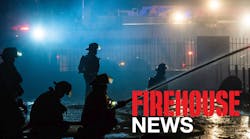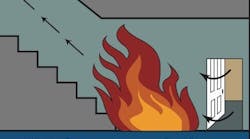A case in point is the naming of the review board to select winners of the federal government's first Public Safety Officer Medal of Valor awards. This is a new program in which the Department of Justice will present five medals every year for outstanding acts of heroism performed by firefighters, emergency medical personnel, police officers and other public safety workers. It was created in the Clinton administration, passed by Congress last year and signed by President Bush, making it the nation's highest non-military award for valor. Everyone agrees it's a great idea, but there is just one hitch: the 11-person review board is made up of eight members from law enforcement, one clergyman and only two from the fire-rescue service.
How could this happen? Why would they appoint a panel of judges that is so top heavy with members from the police side? Along with being surprised and offended by this glaring imbalance, some fire leaders also are concerned that one of the appointees is at the center of a bitter controversy within the fire-rescue service.
It all began when the Justice Department asked the four top congressional leaders to nominate two people to serve on the review board. Senate Majority Leader Tom Daschle (D-SD), Senate Minority Leader Trent Lott (R-MS) and Speaker of the House Dennis Hastert (R-IL) chose both of their nominees from law enforcement. House Minority Leader Richard Gephardt (D-MO) was the only one to split his nominations between fire and police, naming a Missouri sheriff and Chief Richard "Smokey" Dyer, of the Kansas City Fire Department. That's how congressional nominations came out 7-1 in favor of the police.
Three other board members were "presidential" nominations and the White House split it three ways, naming the Archbishop of New York, Edward Cardinal Egan; K. Steven Young, national president of the Fraternal Order of Police; and Thomas K. McEachin, president of the Prince George's County, MD, Fire Fighters Association, which is Local 1619 of the International Association of Fire Fighters (IAFF).
Apparently, the Justice Department accepted all of those named without question and did not see anything wrong with a board that had eight police members and only two from the fire service. "It shows again that the fire service is not taken seriously in Washington," says John Buckman III, president of the International Association of Fire Chiefs (IAFC) . "We're still second-class citizens when compared with the police."
As if the cop-loaded panel isn't bad enough, there are objections within the fire service to the appointment of McEachin, who is perceived by some as being anti-volunteer because of his leading role in pushing the IAFF's "Resolution 43," which calls for career firefighters to be kicked out of the union if they serve as volunteers in their home communities while off duty. The resolution was passed at an IAFF convention two years ago, but not implemented until last February, when Local 1619 filed charges against some 40 District of Columbia firefighters who also are volunteers in suburban Prince George's County. Local 36, which represents the DC firefighters, strongly opposes Resolution 43, as do fire organizations in Prince George's County, the state of Maryland and the National Volunteer Fire Council (NVFC).
"We're concerned about the lack of fire representatives on the review board and the fact that there is no one from the volunteer fire service," says Craig Sharman, the NVFC's government affairs representative. In a letter to President Bush and other officials, NVFC Chairman Philip C. Stittleburg specifically objected to McEachin's appointment, accusing him of leading his local union "on a crusade" to prevent career firefighters from serving as volunteers.
McEachin, who started out as a volunteer before becoming a paid firefighter, replies: "I am not anti-volunteer. Resolution 43 is strictly a union issue." The IAFF also insists that it's an internal fight between two of its local unions and denies that McEachin was recommended for the panel to stick a thumb in the eyes of the volunteers. IAFF General President Harold Schaitberger, who made the recommendation to the White House, declares that he has "the utmost confidence in Tom's understanding of the fire and emergency medical service. He will make fair and equitable decisions as a member of the panel."
In fairness to McEachin, it should be reported that at the review board's first meeting he strongly backed Dyer in making sure that the eligibility guidelines included volunteer fire and EMS personnel. Unfortunately, that doesn't make the controversy go away; what's needed are union and volunteer leaders who are willing to sit down at a table and make a genuine effort to find compromises that will resolve their differences.
Perhaps the biggest mystery is why the Bush administration would recommend an appointee from the IAFF, since it was the first labor union to endorse Al Gore and worked hard to defeat George W. Bush in the last election. Obviously, they were not aware of Resolution 43, which goes against the grain of the President's campaign to encourage volunteerism. We're told that the White House is not happy about being blindsided on this issue or the unbalanced make-up of the review board. But it's too late to do anything about it for this year's awards.
What appears to have happened in this case is a lack of communication between the fire-rescue service, the Department of Justice, the White House and the congressional leadership. No one believes there was a deliberate effort to load the Medal of Valor review board with law enforcement people, but it does reflect the old problem of the fire service's "second class" status whenever it's involved in a project with the police. Somehow, the cops always seem to get more of everything - and that's one thing that hasn't changed since Sept. 11.
Hal Bruno, a Firehouse® contributing editor, retired as political director for ABC News in Washington and served almost 40 years as a volunteer firefighter. He is a director of the Chevy Chase, MD, Fire Department and chairman of the National Fallen Firefighters Foundation.




